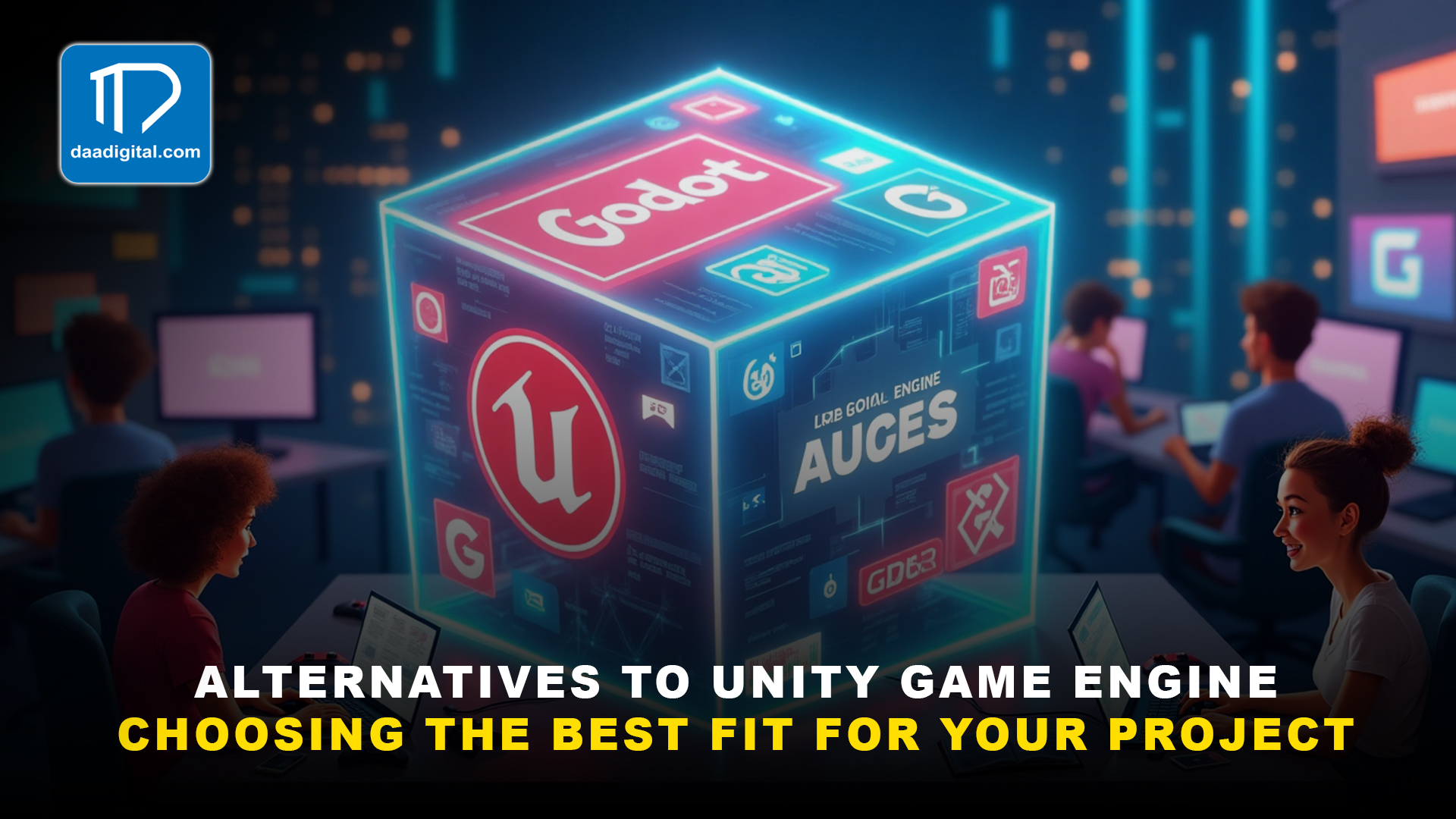
For a long time now, everyone knows that Unity is one of the leading game engines in use today by a multitude of developers for building a plethora of games. However, it’s not the only player in the field.
Whether you’re looking for ease of use, affordability, or particular characteristics better for your game, there’s a range of Unity game engine alternatives available each with unique advantages. Let’s take a look at the alternatives and see what makes each one unique.
1. Unreal Engine: Best Game Engine for High End Graphics
The Unreal Engine is at the very top of computer game creation, since it is incomparable in graphical detail and has an advanced feature set. It is used by vgames with mainstream budgets as well as by smaller studios.
Key Features:
- Visual Fidelity: Virtual environments and characters rendered at high detail.
- Blueprint System: Graphics-oriented gameplay creation system that facilitates game designers to implement gameplay without extensive programming.
- Free Until Profitable: Perfect for small studios or indie game developers since it is free until sales exceed $1 million.
Best For:
Developers with a low tolerance for low definition graphics wishing to build large games or wishing to create materials for virtual production.
2. Godot Engine: Open-Source and Lightweight
Godot has quickly become a very popular free open-source option for unity. Because of its free nature, it is appealing to independent artists and students alike.
Key Features:
- No Licensing Fees: Godot is completely free from any form of licensing, royalties or any revenue share periods
- User-Friendly: Due to its node based architecture, building games is a more approachable task.
- Universal 2D and 3D Functions: The engine provides easy-to-use tools for 3D modeling and 2D sprite painting equally
Best For:
- Indie game developers, teachers and anyone in need of a free lightweight engine for small and mid size games.
3. CryEngine: Stunning Graphics and Realism
CryEngine is a game developing program that helps engineers to improve the visuals and feel of a game. It adds a new dimension to realism projects with its powerful features.
Key Features:
- Easy Level Editing: Engineers can always play around with levels and assets of the game while still doing other tasks.
- Access without cost: CryEngine has an open pricing system so you can use the tools without compulsory fees.
- Diverse Sound Effects: The advanced audio tools employed create the most appropriate sounds to accompany the visuals.
Best For:
- High-end graphics, visually rich games with realistic gameplay.
4. GameMaker Studio 2: A Particular Choice For 2D Games
The developers that seek to build 2D games usually turn to GameMaker Studio 2 as it is fairly simple to learn due to its drag and drop features and easy interface.
Key Features:
- Drag-and-Drop System: Offers a comprehensive drag-and-drop system which is pretty helpful for amateurs and allows them to create games quickly.
- 2D Specialization: The engine is crafted primarily focusing on 2D gaming applications, ensuring slightly better performance rates and efficient operations.
- Flexible Licensing: Users can have a great reach and availability as they have multiple options to choose between free and paid versions.
Best For:
- People who are in the early stages of game development, dedicate their time into game building as a hobby, and target 2D game building projects.
5. Construct 3: Simplicity In A Browser
Prototyping and building games can be really time consuming but with the browser-based engine - Construct 3 not having any downloads allows for a much quicker approach to building games.
Key Features:
- No Coding Required: This feature allows the game developers to build fully functional games using just their visual toolbox which is helpful for anyone without a coding background.
- Rapid Prototyping: The ultimatum of the game building process is made possible due to its simplicity allowing quick onscreen testing of the developed concepts.
- Subscription Model: Multiple pricing plans are available across the board allowing amateur users, students and professional game developers to afford Construct 3.
Best For:
It is best suited for quick 2D game building due to its time constraints, education purposes, and any team that needs a quick turnaround and a web-centric game engine.
6. Defold: Light And Cross Platform
The Defold Engine is a free, light-weight engine supporting the cross platform building of games, and it is best suitable for mobile and HTML5 games.
Key Features:
- Reduced Size: Defold does not take a lot of space, and hence, is quick to set up and has low operational requirements.
- Cross Device Availability: Easily launch games on phones, desktop and other web browsers.
- No Cost: The users are never charged for the use of the engine, no caveats or royalties.
Best For:
- Expert mobile game developers and teams focused on small, quick deployment projects.
Selecting The Right Engine
Look at your project in detail and then choose the best game engine.
- Realistic Graphics: If you are an advanced developer who wants focus on realism and graphics, then Unreal Engine or CryEngine workers best.
- Beginner Friendly: If you are a newbie with no coding experience, then Godot, GameMaker Studio 2 or Construct 3 are great picks.
- Economic: for those with budget restraints, Godot and Defold are free to use, offer excellent tools without requiring a license.
- Specific Requirements: For 2D games, GameMaker Studio 2 and Construct 3 can do wonders, whereas for mobile and HTML5, use Defold.
Final Thoughts
As a final point, a perfect engine will always depend on your intended project, proficiency, and resources. Every one of these Unity alternatives comes with a set of unique features that are tailored to guarantee that your dream game can always be developed.
All the available tremendous tools mean that for a project engine is the first part to figuring out how to make a desired effect, image, or an idea.
